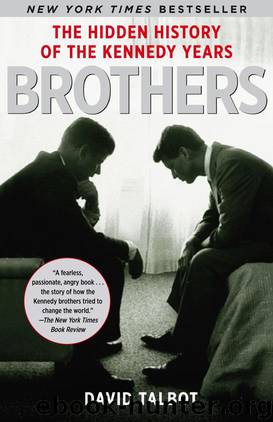Brothers: The Hidden History of the Kennedy Years by Talbot David

Author:Talbot, David [Talbot, David]
Language: eng
Format: epub
Publisher: Free Press
Published: 2007-05-07T13:00:00+00:00
5
DALLAS
President Kennedy looked tired and somber as he stood at the lectern in the spacious State Department Auditorium on Halloween 1963. There were dark bags beneath his eyes and his shoulders stooped, as if from pain or fatigue. It was the second to last press conference of his administration, a forum in which he generally sparkled. These were occasions for the deft and charming president to show off, and he did so often, holding sixty-four news conferences in his 1,037 days in office. Though he was invariably well-prepared, he always seemed spontaneous and light on his feet. There was no sign of effort in his smooth replies and displays of mischievous wit. A reporter tried to break through his easy self-confidence at one press conference. “The Republican National Committee recently adopted a resolution saying you were pretty much of a failure,” he poked Kennedy. “How do you feel about that?” With a comic’s sense of timing, JFK waited for the nervous chuckling in the auditorium to fade before responding. “I assume it passed unanimously.”
But Kennedy seemed downcast at his October 31 news conference. The questions he was asked that day vividly demonstrated the pressures he was under: What were his intentions in Vietnam? Should U.S. generals stationed overseas be given the authority to order nuclear strikes, as Senator Goldwater has urged? Was the president expecting a white backlash against his civil rights policies in the forthcoming Philadelphia municipal elections? Castro has captured several CIA agents and is threatening to execute them—would he care to comment?
A woman reporter sensed the president’s heavy spirit. She reminded him that after the Bay of Pigs she had asked him how he liked being president. Now, prompted by his dark mood, she repeated the question. It was a choice opportunity for Kennedy to exhibit his wit, to neatly deflect the emotionally probing query with a joshing jab at his Republican opponents or a self-deprecating quip. But, instead, he grew philosophical. In a voice oddly meditative for a man soon to announce his reelection bid for the White House, he mused that he found the job “rewarding.” And then he invoked the wisdom of the ancient Greeks, as his brother would often do in seeking solace after he was gone. “I have given before to this group,” Kennedy told the 304 reporters assembled in the auditorium’s tiered seats, “the definition of happiness of the Greeks, and I will define it again. It is the full use of your powers along the lines of excellence. I find, therefore, the presidency provides some happiness.”
It was hardly a ringing endorsement of the job. Despite his solemn mood, however, Kennedy was looking forward to the 1964 election. He predicted the race would pit him against Goldwater, a man with whom he had developed a friendly relationship in the Senate but who represented the opposite pole of the political spectrum. By fall 1963, JFK had settled on a peace theme for his reelection campaign—and he sensed that the American people, tired of being held captive by nuclear terror, would reward him with victory.
Download
Brothers: The Hidden History of the Kennedy Years by Talbot David.epub
This site does not store any files on its server. We only index and link to content provided by other sites. Please contact the content providers to delete copyright contents if any and email us, we'll remove relevant links or contents immediately.
| U.K. Prime Ministers | U.S. Presidents |
Waking Up in Heaven: A True Story of Brokenness, Heaven, and Life Again by McVea Crystal & Tresniowski Alex(37786)
Empire of the Sikhs by Patwant Singh(23073)
We're Going to Need More Wine by Gabrielle Union(19034)
Hans Sturm: A Soldier's Odyssey on the Eastern Front by Gordon Williamson(18573)
Leonardo da Vinci by Walter Isaacson(13316)
The Radium Girls by Kate Moore(12018)
Tools of Titans by Timothy Ferriss(8365)
Educated by Tara Westover(8045)
How to Be a Bawse: A Guide to Conquering Life by Lilly Singh(7472)
Permanent Record by Edward Snowden(5838)
The Last Black Unicorn by Tiffany Haddish(5629)
The Rise and Fall of Senator Joe McCarthy by James Cross Giblin(5275)
Promise Me, Dad by Joe Biden(5141)
The Wind in My Hair by Masih Alinejad(5092)
A Higher Loyalty: Truth, Lies, and Leadership by James Comey(4954)
The Crown by Robert Lacey(4807)
The Iron Duke by The Iron Duke(4349)
Joan of Arc by Mary Gordon(4101)
Stalin by Stephen Kotkin(3957)
